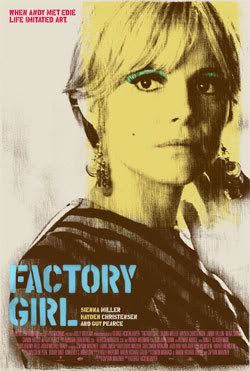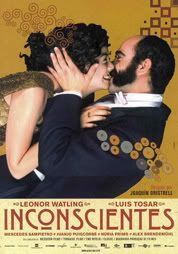
I’ll have to admit a certain fascination with all things Warhol. Especially the whole mystique of the Factory. I’ve always thought of it as the Left Bank of the 60s. Sort of a perfect storm of inspiration, creativity and chaos. It apparently, had a bit of everything 70s -- Lots of drugs, tons of sex, and rock ‘n roll ala the Velvet Underground. It is also famous for taking people and chewing them up and spitting them out, while a detached remote Andy reigned benignly over it all.
There’s some fascinating characters that came out of there. There was hunky bad boy drug addict Joe D'Alessandro. Viking songstress Nico and then also Lou Reed with the Velvet Underground. Then just a whole slew of various wannabees, drug addicts and hanger ons.
But probably the most famous of the Factory celebrities was Edie Sedgewick. Who supposedly gave us the term so often used now “superstar”. She was a bit of a poor little rich girl, from a totally nonfunctional family. An old money socialite who depending on who you walk to was either a beautiful flawed total nutcase carrying on the family tradition of nervous breakdowns and self destruction or she was a fragile beauty that Andy Warhol used up and discarded like yesterday’s empty tomato soup can.
Sienna Miller is in the title role, and manages to show Edie’s early brashness and charm that pulled so many people in, then the just utter lost soul who is strung out in the Chelsea while her friends shoot her up, make porno movies, and steal her silver and furs.
Guy Pierce is almost unrecognizable as the pasty, blotchy faced and emotionally distant Warhol. Warhol does not fair well in the movie. He comes across as vapid, and petty. He seems to be fascinated with Edie, but at the same time, two faced and an unreliable friend.
A Bob Dylan-esque character is central. Apparently in real life Edie was seeing him for sometime. He seems to be her savior for a while, but then abandons her to the factory and the drugs, going off to get secretly married. Bob Dylan apparently tried to block the release of the movie. Though I don’t think he comes across as the big bad guy, he just walked away from a bad situation, when he was probably Edie’s last hope.
Also, I have to mention one of my favorite actresses, Illeana Douglas, who plays Vogue Editor, Diana Vreeland.
All in all, I know this is one interpretation of the whole Warhol Factory scene and the tragedies that surrounded it. Warhol definitely loses a bit of his luster in this movie. However, you feel sorry for him in a way, being such a tragic lonely figure, that can’t reach out or make any real connections.
In the end, I think this says a lot about current pop culture. That whole 70s Studio 54/Factory scene may even have started a lot of it. Everyone’s fascination with their 15 minutes of fame, and superstar status continuing even today with Britney and Paris.
And where Andy Warhol elevated common cultural items like soup cans and advertising images to art status. It seems he did just the opposite with Edie, taking a real beauty and helping transform her into a bruised common heroin addict in a seedy hotel.



